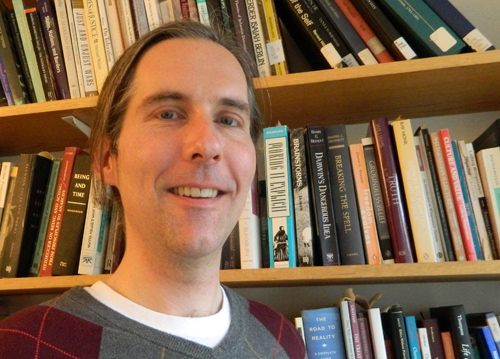
As a philosopher, Prof. John Hacker-Wright takes a broad perspective. “I stand far back and explain,” he says.
As a moral philosopher, what he explains is the role of morals, values and virtues in the world and in people’s lives.
His current project, funded by the Social Sciences and Humanities Research Council, is entitled “Virtue, Agency and Human Nature” and his plan is that it will be a book, probably completed by 2013.
Hacker-Wright says that you need a little history to understand the premise. In medieval times, people saw the world as an ordered place, with God at the steering wheel organizing things according to a moral purpose or standard. That gave rise to the idea of “natural law” – rules for morality that originated in nature. What they called sexual perversions, for example, were considered immoral because they were violations of natural law and God’s laws.
For the last century or two, though, people have begun to see the world and nature in more mechanical terms, run by the laws of physics rather than the laws of God. “If we see a law of physics being violated, that just means we didn’t really understand the law,” says Hacker-Wright.
Yet we still have a sense that some things – such as murder – are just wrong. We also have a sense of positive obligation about other things, such as seeking justice. Where do these ideas come from? Hacker-Wright says that in the beginning of the 20th century, these were seen as “attitudes” and morality was deemed to be subjective.
“The problem with morality being subjective is that then you can say that there was nothing wrong with the Nazis, they just had a different point of view,” says Hacker-Wright. “So after the 1940s, philosophers began looking for a way to have an objective morality – an argument that doesn’t just end with ‘we don’t like that.’”
Hacker-Wright’s approach is based on the concept that reason is part of human nature, so we can say that people are behaving appropriately when they apply reason to their actions. “In a way, I am reviving the old concept of natural law: I would say we are defective as the type of animal we are when we don’t reason well,” he says.
Reasoning about moral behaviour needs to take into account the human susceptibility to physical harm, among other things, Hacker-Wright argues. That becomes an argument against violence and murder, he says, because we couldn’t sustain ourselves as rational human beings if we didn’t see cruelty as a vice or benevolence as a virtue.
He also sees taking care of others, especially babies and children, as a virtue that can be argued for. Given the helpless nature of an infant, “we don’t get to become rational adults unless someone else takes care of us,” he explains. Therefore parenting and child-rearing are things we need to see as important and worthy of support even if we don’t have children ourselves.
His ideas don’t require that you believe in a higher power, or in the idea that human beings were put on the Earth for a particular reason. “I am situating moral values in the kind of creature that we are,” says Hacker-Wright. “If we are in the game of morality at all, we must be able to take reason seriously in thinking about how to act. What I’m doing is setting out a systematic case for a rationally defensible world view, with morality as a part of it, that doesn’t require a belief in God.”
During the research process, Hacker-Wright says he’s been struck by the continued relevance of the ideas of philosophers from the distant past, including Immanuel Kant and Aristotle. “Aristotle also places emphasis on virtue, for example, and sees the application of reason to action as a central characteristic of human beings.”
In other areas, he admits, Aristotle’s ideas diverge from Hacker-Wright’s. “Aristotle didn’t see much of a problem with slavery, and he felt that women were inherently inferior. In those cases, he just had his facts wrong.”